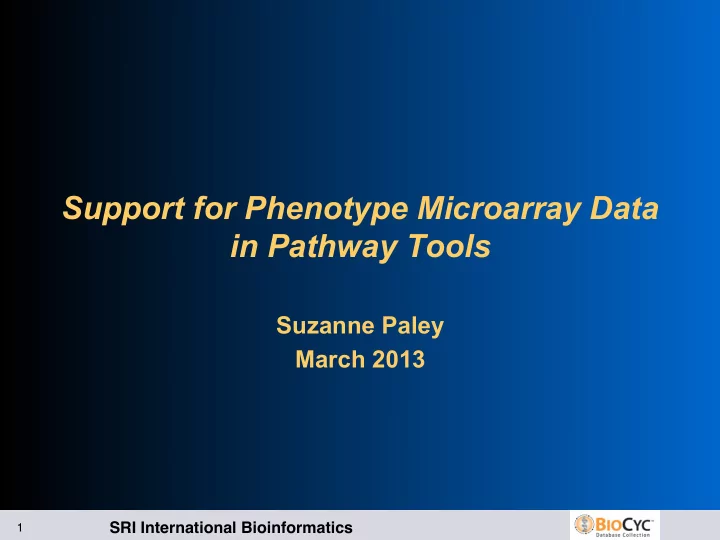

Support for Phenotype Microarray Data in Pathway Tools Suzanne Paley March 2013 SRI International Bioinformatics � 1 �
PM display on All Growth Media Page SRI International Bioinformatics � 2 �
PM Growth Medium Representation l Plate ID, Well ID l Constituents Concentration Role: source of C, N, P or S l Base medium l Name l Abbreviated name (just the added compound for PM media) l Citation, comment l pH l Osmolarity (computed from constituent concentrations) SRI International Bioinformatics � 3 �
Growth Observation Representation l Growth media l Growth status: growth, no-growth, or low-growth No support for capturing quantitative data l Citation, comment l Experimental variables Aerobic/anaerobic Temperature Wildtype or knocked out genes SRI International Bioinformatics � 4 �
Conflicts l Conflicts occur when multiple observations for the same medium and conditions record different growth statuses We cannot detect conflicts when experiments use slightly different but equivalent media. l Conflict can be resolved by a curator This creates a new, privileged growth observation frame Curator should record rationale with comment or citation GUI will still show all primary observations SRI International Bioinformatics � 5 �
Growth Medium Display SRI International Bioinformatics � 6 �
PM Data in EcoCyc l 5 Aerobic Datasets (4 for plates 2-4) Carbon Nitrogen Phosphorus Sulfur Total Total Wells 190 95 59 35 379 Observations 855 367 233 130 1585 Wells w/ conflicts 61 35 10 13 119 Resolved conflicts 53 10 6 5 74 Remaining 8 25 4 8 45 unresolved Remaining growth/no- 7 24 1 1 33 growth conflicts SRI International Bioinformatics � 7 �
Other Growth Observations in EcoCyc l Low throughput data: Wildtype observations from literature for 23 media Wildtype observations generated by our group for 21 media l High throughput gene knockout data 5 datasets 2 on rich media 2 on glucose media 1 on glycerol media 17,269 total knockout growth observations SRI International Bioinformatics � 8 �
Navigating to All Growth Media Page SRI International Bioinformatics � 9 �
Changing Display Conditions l On All Growth Media page, can specify different set of conditions l Colors in display tables will update accordingly SRI International Bioinformatics � 10 �
Generating Heatmaps SRI International Bioinformatics � 11 �
Importing PM Data l File->Import->Phenotype Microarray Data from Spreadsheet … l Spreadsheet must be saved as tab-delimited text l One file per PM plate l Wells can be identified by either well ID or compound name/ID l Data values in spreadsheet can be either quantitative or qualitative If quantitative, must specify cutoff values for no/low and low/ normal growth If qualitative, must specify what text values match normal/low/ no growth SRI International Bioinformatics � 12 �
Importing PM Data SRI International Bioinformatics � 13 �
Importing PM Growth Media l Can either use base media from EcoCyc (or other PGDB) or create your own. SRI International Bioinformatics � 14 �
Recommend
More recommend